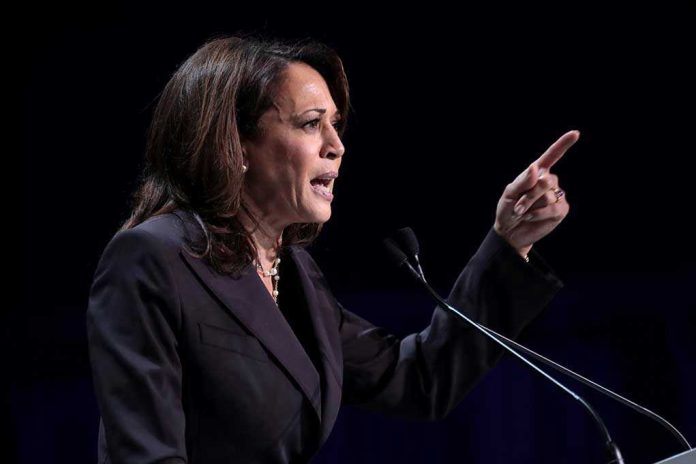
Kamala Harris’s public condemnation of the “broken” political system after decades in office has ignited fierce backlash—even from within her own party—highlighting the growing crisis of credibility facing Democratic leadership.
Story Snapshot
- Kamala Harris called the U.S. political system “broken” in her first interview after losing the 2024 election, sparking intra-party criticism.
- Democratic commentators and influencers mocked Harris, pointing to the irony of her blaming the system after a long career within it.
- Harris confirmed she will not seek elected office again, including the California governorship, despite speculation.
- The controversy underscores deepening divisions and declining public trust in Democratic leadership after years of partisan conflict.
Harris’s “Broken System” Remark Sparks Party Backlash
On July 31, 2025, former Vice President Kamala Harris delivered her first major post-election interview on “The Late Show with Stephen Colbert.” Harris declared the U.S. political system “broken,” expressing frustration with institutional gridlock and confirming she would not seek further elected office. Her statement—given after losing the 2024 presidential race and stepping down in January—prompted immediate criticism from prominent Democratic influencers and commentators, who highlighted the irony of Harris’s position. Many questioned how someone so deeply embedded in the system for decades could now claim it was beyond repair, suggesting her remarks reflected political disillusionment rather than leadership.
The timing of Harris’s remarks added fuel to the fire. Having served as California Attorney General, U.S. Senator, and Vice President, her career was marked by high-profile policy battles and declining approval ratings. The 2024 election cycle itself was one of the most polarized in recent memory, with Harris’s defeat signaling a major setback for both her and the Democratic establishment. Her comments on Colbert’s show came just as the Democratic Party was attempting to regroup, leaving many within her own ranks frustrated by what they saw as a public airing of internal grievances at the worst possible moment for party unity.
Democratic Influencers Lead Mockery and Criticism
Unlike previous instances where partisan opponents led criticism, this time the loudest voices came from within Harris’s own party. Influencers and strategists openly mocked her for blaming the very system she benefited from, with some accusing her of hypocrisy. Media outlets amplified this narrative, focusing on the contradiction between Harris’s condemnation and her extensive record of public service. The episode quickly became a symbol of broader Democratic leadership struggles, as party figures grappled with how to present a message of accountability and renewal while facing internal dissent and public skepticism.
Harris’s explicit rejection of any future political run—including for California governor, where she had polling advantages—further signaled her departure from formal politics. Instead, she is now promoting her memoir, “107 Days,” and repositioning herself as a commentator on American democracy. This transition has been met with mixed reactions: some view her candor as courageous, while others see it as an abdication of responsibility at a critical juncture for the party. The situation has left Democrats divided over how to respond, with some calling for new leadership and generational change heading into the 2026 election cycle.
Implications for Democratic Leadership and Public Trust
Harris’s remarks have intensified debates about accountability and leadership within the Democratic Party. In the short term, her comments have sparked heated discussion about who bears responsibility for the nation’s political dysfunction and how the party should address declining trust in its institutions. In the long term, her exit and high-profile critique raise questions about the viability of establishment figures and the potential for renewed grassroots movements or outsider candidates. The controversy has also reinforced public skepticism about government effectiveness, potentially influencing voter engagement and candidate selection in upcoming elections.
For Americans frustrated by years of overreach, fiscal mismanagement, and partisan gridlock, the spectacle of a high-ranking official decrying the very system she helped shape underscores the need for genuine reform—not just rhetoric. As the Democratic Party recalibrates its leadership, many are watching to see whether this episode marks a turning point or a warning sign for the future of American governance.
Sources:
Harris calls US political system ‘broken’ in first interview since election loss
Kamala Harris: Frontrunner for California governor?







